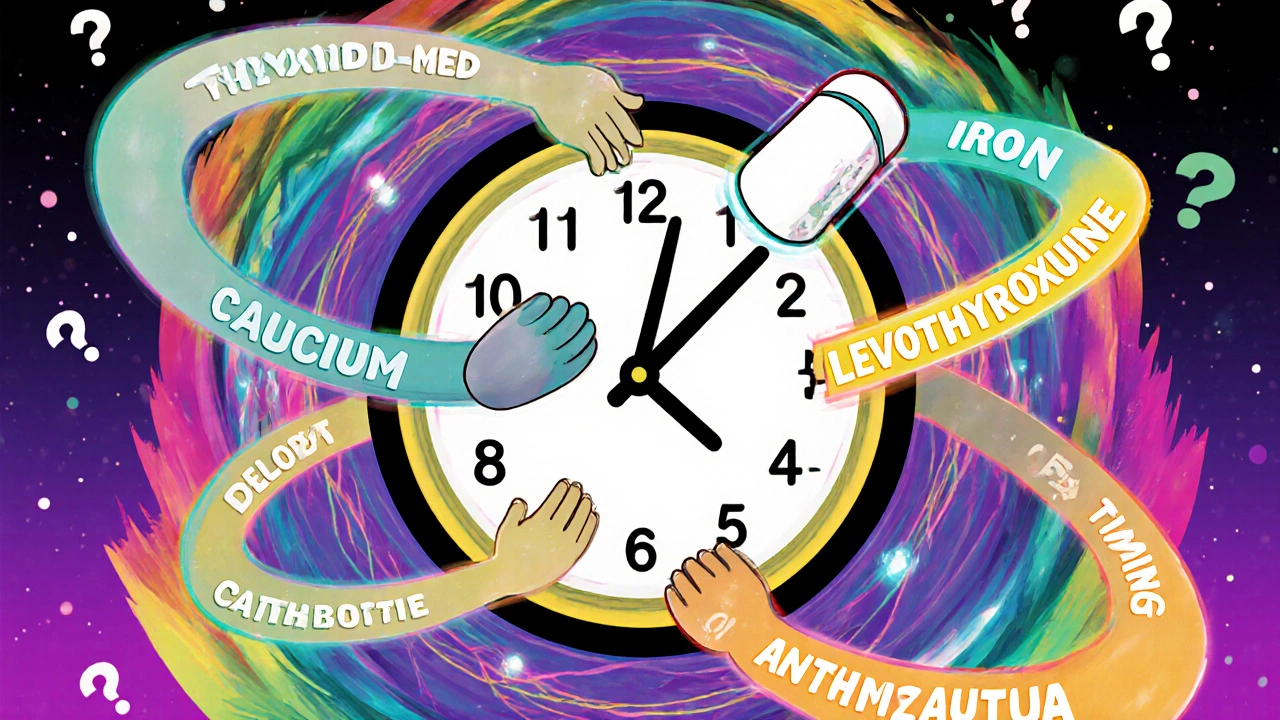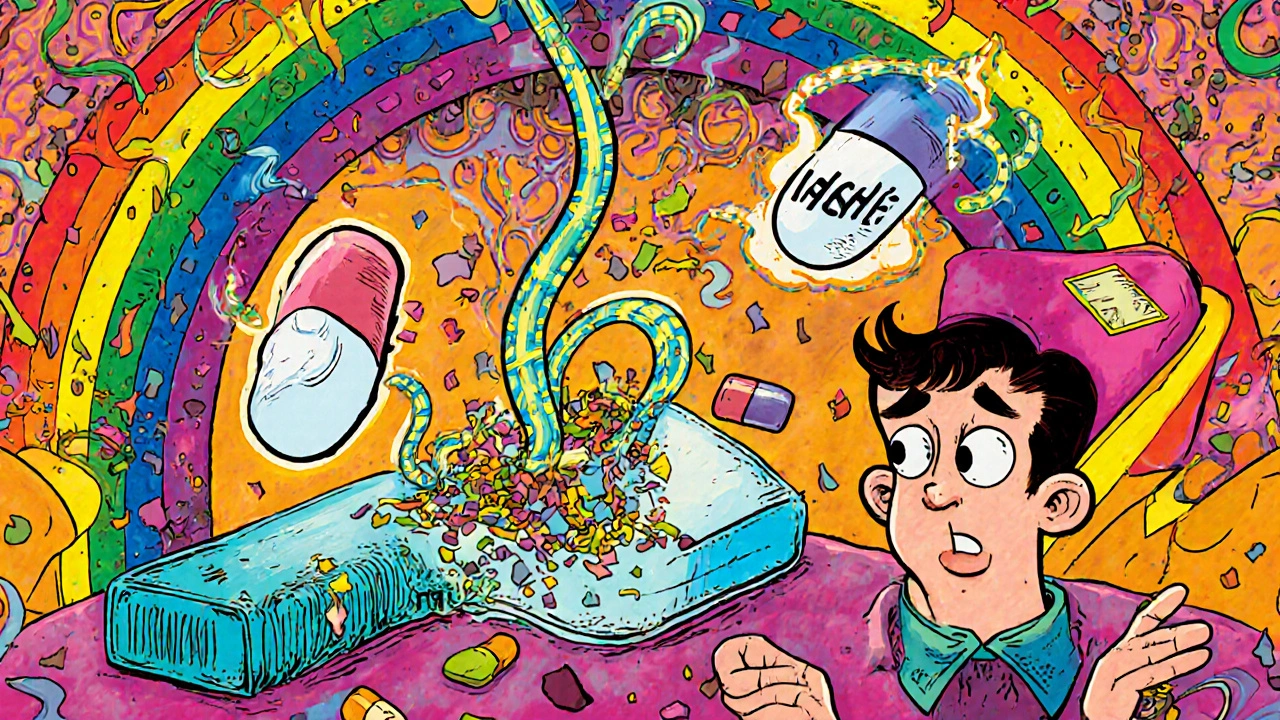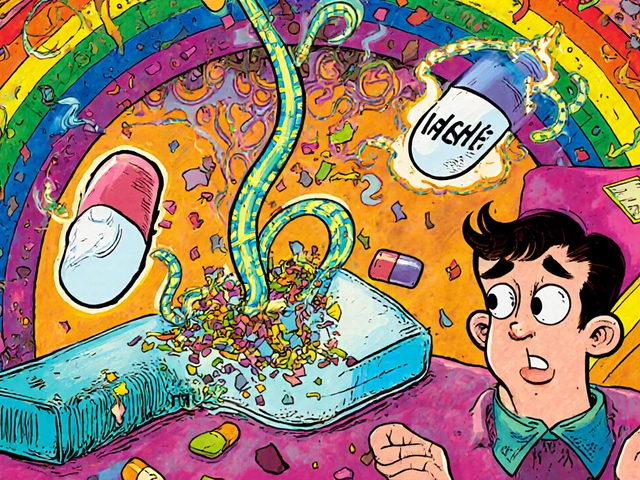Millions of people take calcium and iron supplements every day - for strong bones, to fight anemia, or because their doctor recommended it. But what most don’t realize is that these everyday supplements can quietly wreck the effectiveness of their prescription meds. If you’re on antibiotics, thyroid medicine, or heartburn pills, your calcium or iron pill might be making them useless. And you won’t even know it until the infection doesn’t clear up, your thyroid levels stay off, or your anemia gets worse.
How Calcium Blocks Antibiotics
Calcium doesn’t just sit there. When it meets certain antibiotics, it binds to them like glue. This binding creates a compound your body can’t absorb. The result? The antibiotic never reaches the infection. You take your pill, feel fine, but the bacteria keep multiplying. This happens most often with tetracyclines (like doxycycline) and fluoroquinolones (like ciprofloxacin). Research from U.S. Pharmacist shows calcium carbonate can cut ciprofloxacin’s absorption by 40%. That’s not a small drop - it’s enough to turn a cure into a chronic problem. One study tracked patients on ciprofloxacin for a urinary tract infection. Those who took calcium supplements at the same time had much higher rates of treatment failure and recurring infections. The fix? Don’t take calcium within two hours of these antibiotics. But even two hours isn’t always safe. Many pharmacists recommend four to six hours apart. If you’re on a short course - say, seven days for a sinus infection - it’s easier to just skip your calcium pill entirely during that time. Your bones won’t suffer. Your infection will.Iron and Antibiotics: A Similar Battle
Iron does the same thing to tetracyclines and fluoroquinolones. Ferrous fumarate, ferrous sulfate - they all bind to these antibiotics. The same rule applies: keep them separated by at least two hours, and ideally four. But here’s the twist: iron doesn’t just fight antibiotics. It fights your own stomach acid. Iron needs acid to dissolve and get absorbed. That’s why taking iron with orange juice helps - the vitamin C and mild acid boost absorption. But if you’re taking a proton pump inhibitor (PPI) like omeprazole or pantoprazole for heartburn, your stomach acid is suppressed. Suddenly, your iron pill becomes almost useless. You’re taking it every day, but your hemoglobin won’t budge. The same goes for H2 blockers like famotidine. These drugs reduce acid too. If you’re on iron for anemia and also take heartburn meds daily, your iron might not be working - and your doctor might think you’re noncompliant. You’re not skipping doses. Your stomach just isn’t cooperating.Thyroid Medicine and Calcium: The Silent Saboteur
Levothyroxine, the most common thyroid hormone replacement, is one of the most sensitive drugs to mineral interference. Calcium doesn’t just reduce its absorption - it can cut it by half. A study in the South Medical Journal showed that when patients took calcium within four hours of levothyroxine, their TSH levels spiked, meaning their thyroid wasn’t getting the signal it needed. This isn’t a myth. It’s a documented clinical problem. Patients who started taking calcium supplements for osteoporosis suddenly felt fatigued, gained weight, and got cold easily - all signs their thyroid meds weren’t working. Their doctor increased the dose. Still no improvement. Only when they spaced the calcium out by four hours did their TSH levels normalize. The rule here is strict: take levothyroxine on an empty stomach, first thing in the morning, with water only. Wait at least four hours before taking any calcium supplement, multivitamin, or even antacids like Tums. If you can’t wait that long, switch your calcium to bedtime - after dinner, at least four hours after your last dose of thyroid medicine.
Iron and Milk: A Common Mistake
Parents often give iron supplements to kids with anemia. And it’s common to pair it with milk to make it taste better. Big mistake. Milk has calcium. Calcium binds to iron. The iron passes right through the body. HealthyChildren.org highlights this as a frequent error in pediatric care. Kids on iron for anemia who drink milk with their dose show little to no improvement in blood counts. The fix? Give iron with orange juice, apple juice, or even a vitamin C tablet. The acid helps. The calcium doesn’t. Same goes for adults. Don’t take your iron pill with your morning coffee and milk. Wait until after breakfast - or better yet, take it two hours before breakfast, on an empty stomach, with a glass of orange juice.Timing Is Everything
There’s no one-size-fits-all schedule. But here’s a simple, practical guide based on real-world clinical advice:- Calcium and antibiotics (tetracyclines, fluoroquinolones): Separate by at least 4 hours. Avoid calcium entirely during the antibiotic course if possible.
- Calcium and levothyroxine: Take levothyroxine first thing in the morning. Wait 4 hours before taking calcium.
- Iron and antibiotics: Take antibiotics 2 hours before or 4 hours after iron.
- Iron and heartburn meds (PPIs, H2 blockers): Take iron at least 2 hours before the heartburn pill. If you take heartburn meds daily, talk to your doctor about switching to a non-acid-reducing option or adjusting your iron dose.
- Iron and dairy: Never take iron with milk, yogurt, or cheese. Use orange juice instead.
What About Multivitamins?
Most multivitamins contain calcium, iron, or both. If you’re on any of the medications above, your multivitamin might be doing more harm than good. Check the label. If it has more than 50 mg of calcium or iron, it’s likely interfering. The solution? Take your multivitamin at a different time - say, lunch or dinner - and keep it at least 4 hours away from thyroid meds or antibiotics. Or switch to a multivitamin without calcium or iron and take those minerals separately, on a different schedule.
Why Don’t Doctors Always Tell You?
It’s not that they don’t know. It’s that they assume you’ll tell them. Most patients don’t mention supplements unless asked. A 2004 study found that 67% of women and 25% of men take calcium supplements regularly - but only about 30% tell their doctor. The same goes for iron. People think supplements are harmless. They’re not. Pharmacists are trained to catch these interactions. But if you don’t tell them you’re taking calcium or iron, they can’t help. Always list every supplement on your medication list - even the ones you take “just for bone health.”What If You’ve Already Been Taking Them Together?
If you’ve been taking calcium with your antibiotic or iron with your thyroid pill for weeks or months, don’t panic. But do act. 1. Stop taking them together right away. 2. Schedule a blood test if you’re on thyroid meds - check your TSH and free T4 levels. 3. If you’re being treated for anemia, ask for a repeat iron panel (ferritin, hemoglobin). 4. Talk to your pharmacist. They can check your full list of meds and supplements and give you a personalized timing plan.Bottom Line
Calcium and iron aren’t dangerous. But they’re powerful. And when they meet the wrong meds, they can turn your treatment into a waste of time and money. The fix isn’t complicated. It’s just timing. Separate them. Space them out. Know which ones clash. And never assume a supplement is too harmless to ask about. If you’re on any of these medications - antibiotics, thyroid pills, or heartburn drugs - and you take calcium or iron, you need a plan. Don’t guess. Don’t hope. Ask your pharmacist. Write it down. Stick to it. Your health depends on it.Can I take calcium with my antibiotics?
No, not at the same time. Calcium binds to antibiotics like tetracycline and ciprofloxacin, blocking their absorption. Take them at least 4 hours apart. For short antibiotic courses, it’s safer to skip calcium entirely until you’re done.
Does iron affect thyroid medication?
Iron doesn’t directly interfere with thyroid meds like levothyroxine the way calcium does. But many iron supplements contain calcium or other minerals that do. Always take iron at least 4 hours before or after thyroid medication to be safe.
Why does orange juice help iron absorption?
Orange juice contains vitamin C and mild acid, which help dissolve iron in the stomach so it can be absorbed. Avoid milk, coffee, or tea with iron - they contain calcium and tannins that block absorption.
Can I take calcium at night if I take levothyroxine in the morning?
Yes. If you take levothyroxine first thing in the morning on an empty stomach, waiting until bedtime (at least 4 hours after your last meal) to take calcium is a safe and common strategy. Just make sure it’s not within 4 hours of your thyroid dose.
Do all antacids interfere with iron?
Not all. Antacids containing calcium carbonate (like Tums) interfere because they reduce stomach acid and contain calcium. But antacids with magnesium or aluminum hydroxide don’t have the same effect. Still, it’s best to space iron at least 2 hours before any antacid unless your doctor says otherwise.
Should I stop taking calcium or iron if I’m on medication?
No - don’t stop without talking to your doctor. Instead, adjust the timing. Most interactions can be avoided by spacing doses properly. Your doctor or pharmacist can help you build a schedule that keeps your meds and supplements working.








November 28, 2025 AT 06:07
shawn monroe
Bro, this is why I stopped taking Tums with my doxycycline. I was getting sinus infections every 3 months like clockwork. Then I read a study that calcium carbonate reduces cipro absorption by 40% - mind blown. Now I take my antibiotics with water only, wait 6 hours for my calcium, and my immune system actually works now. 🤯
November 29, 2025 AT 00:08
Rebecca Price
Wow. I’ve been taking my iron with my morning coffee and yogurt for years. No wonder my ferritin’s been stuck at 12 for 18 months. My doctor kept upping the dose like I was lying. Turns out I was just giving my body a calcium smoothie instead of iron. Thanks for the wake-up call. 🙏
November 29, 2025 AT 12:14
marie HUREL
I’m a nurse and I see this all the time. Patients think supplements are ‘natural’ so they’re safe. But calcium and iron are like molecular glue - they stick to meds and make them useless. I always ask my patients about supplements during med reviews. Most don’t even think to mention them. This post is a lifesaver for people who don’t know how to talk to their doctors.
Also, orange juice > milk for iron. Always.
December 1, 2025 AT 02:26
Shubham Semwal
LOL. You people take supplements like candy. If you can’t follow basic timing rules, maybe you shouldn’t be popping pills at all. My grandma took levothyroxine for 30 years with calcium and never had an issue. Probably because she didn’t overthink it. Just take your meds and shut up.
December 2, 2025 AT 21:41
Lauren Zableckis
I took my thyroid med with my multivitamin for 2 years. My TSH was through the roof. My doctor kept saying I was ‘noncompliant.’ I was so angry. Then I finally read the label - my ‘daily vitamin’ had 600mg calcium. I switched to a calcium-free version and waited 4 hours. TSH normalized in 6 weeks. This is the kind of info no one tells you.
December 4, 2025 AT 06:22
Mira Adam
It’s not about timing. It’s about the system. Why are we expected to remember 17 different schedules for 5 pills? Why isn’t the pharmaceutical industry designing drugs that don’t interact with basic nutrients? This is a failure of medicine, not a failure of patients. We’re being asked to be pharmacists on top of being sick.
December 5, 2025 AT 18:33
Miriam Lohrum
There’s a deeper truth here: we treat our bodies like machines that need to be tuned, not systems that need to be understood. Calcium isn’t the enemy. Iron isn’t the villain. The real issue is the assumption that we can isolate nutrients and drugs from the complexity of our biology. Maybe we need to ask not ‘when’ to take them - but ‘why’ we need them at all.
December 6, 2025 AT 07:29
archana das
In India, we’ve always known milk blocks iron - our grandmas told us to take iron with lemon juice. But now doctors here push calcium supplements like they’re candy. I wish more people knew this. Simple things, like timing, save lives. No fancy tech needed. Just respect your body’s rhythm.
December 7, 2025 AT 00:08
Sam HardcastleJIV
One might posit that the entire paradigm of nutritional supplementation is predicated upon a fallacy of reductionism - the notion that isolated molecules, divorced from their natural matrices, can meaningfully replicate physiological function. The very act of ingesting calcium carbonate in pill form, divorced from dairy or bone broth, may be an anthropogenic distortion of evolutionary biochemistry. One wonders whether the solution lies not in temporal separation, but in systemic reintegration.